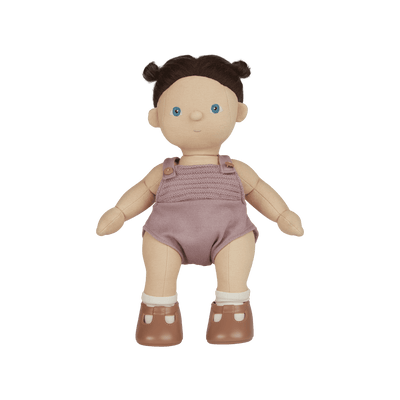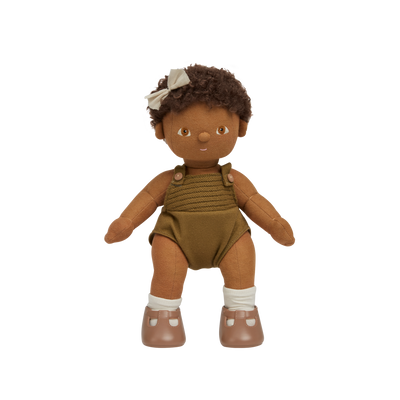Play is a child's way of engaging and making sense of the world. Role play may appear to be an amazingly simple activity, yet children learn practical life skills within it. Between the ages of two and three, kiddos begin to explore the world of imaginative play. Not only does this type of play teach children important skills like feeding, dressing, and caring for others, it also taps into developing social skills and empathy. Read on for more benefits and tips to encourage a special bond with your little one and their doll.
~
“When children create imaginary worlds and role play with dolls, they communicate at first out loud and then internalise the message about others’ thoughts, emotions and feelings. This can have positive long-lasting effects on children, such as driving higher rates of social and emotional processing and building social skills like empathy that can become internalised to build and form lifelong habits.” - Dr Sarah Gerson, a neuroscientist at Cardiff University.
-

Introduce Problem Solving
Assist your kiddo by introducing incidental learning opportunities. For example, during pretend mealtimes, you might ask your child questions like, "What's on the menu today?" or "What happens next?". Prompt critical thinking by inserting dilemmas that your child will have to solve e.g., "oh no! Dolly's food is too hot to eat". Your little one can work through these tricky scenarios with guidance.
Another option would be to play pretend doctor, encouraging your little one to care for their doll. Set them up with a pretend stethoscope, thermometer and bandages, or let them be a parent for the afternoon by wrapping their doll up in a cosy blanket and feeding them pretend soup.
This is an especially useful time to help them navigate things that they’re unsure of, making it a safe and enjoyable method of processing feelings in different ways for unique situations.
-

Foster Creativity
Allow children to explore and act out different scenarios that they may not be able to experience in real life. For example, dining at a restaurant with mum & dad, or nurturing their own little doll baby - perfect for kiddos who are about to welcome a younger sibling.
This also plays an important role in sharing mum and dad’s time with a new little sibling but can also help them get used to having someone smaller in the house! Depending on your older child's age, getting used to a sibling can be more significant if there are a few years’ difference between them and their younger sibling. Make those trips out as a family something to look forward to - but equally, it helps them understand the new dynamic before your newborn arrives!
-

Promote Physical Development
Fun activities such as dressing a Dinkum Doll in shoes and socks are great for developing hand-eye coordination. Provide a box of props filled with doll clothes and accessories for your child to explore their own sense of style. You can also help them learn about how to dress to suit the weather with doll clothes that match the seasons. It’s also a great way to make those evening (or morning) routines more enjoyable. Not only does it encourage them to remember all the little things they do to care for themselves, but they have company along the way! Caring for a doll and caring for yourself through brushing teeth and hair, getting dressed for the day and having breakfast are all wonderful ways to get their brains engaged with coordination and engaging in healthy habits.
Along with hand-eye coordination and self-care, physical development also extends to their capabilities more generally - including balance and resilience. The possibilities are endless here, with imaginative games being a fantastic way to engage their growing minds and bodies. Treat them to a pram, doll carrier or Sollie stroller for those walks further afield. If you have an outdoor garden space or a park nearby, take your little explorer and their doll out for an adventure. They could be heading into a new and exciting land or just taking their beloved doll out for a picnic.
-

Teach Language Skills
Expand your child's vocabulary by encouraging them to describe the way they are playing with their dolls. Ask them to describe the scenario (e.g., "We are riding a pretend bus to the shops"), and encourage them to vocalise emotions ("We are excited to be on a bus!"), and the conversation between your child and their doll.
If your little one is starting kindergarten and they’re feeling nervous, dolls are a great means to roleplay conversations when they’re trying to make new friends. As a parent, you can adopt the role of the child your little one is speaking to, making for a comfortable and familiar environment to practice introductions and help them feel more confident when they’re away from you.
-

Develop Social Skills and Empathy
Playing with dolls encourages children to learn about and consider other perspectives during solo and group play. Model empathetic behaviour during playtime and encourage children to talk about their thoughts and emotions to further develop these crucial skills.
Dolls can also be wonderful companions and confidants, making for the perfect means to express themselves. Whether your little one uses their soft textures to self-soothe, expresses how they’re feeling through their doll, or simply practices their interpersonal skills by caring for them, dolls offer both a mirror to their emotions and a means to regulate.
Tips For Encouraging Imaginative Play
Rediscover your inner child and model familiar routines with props like a toy bottle or hairbrush. Show your child how to gently rock, feed, and groom their doll. This will prompt your child to mirror your behaviour.
Boost creativity with plenty of props and playmates (adults and kiddos alike). Allow your child as much time as they like to play and explore the imaginative worlds they create.
One of the best things about dolls is that they’re an open-ended form of play. That means that there’s no wrong way to play with a doll; whatever your child’s imagination comes up with is perfect as it is. In contrast to toys that are made to be played with in just one way, dolls offer everything: a little friend and companion, a playmate, a means of navigating big feelings and exploring hobbies and interests.
Involve your kiddos in daily chores and turn everyday asks into an opportunity to learn whilst playing. Your child could have their own cloth to wipe a surface, or assist in the kitchen with child-safe utensils or with an empty bowl and spoon to do their own pretend cooking.
 Welcome to Olli Ella!
Welcome to Olli Ella!















